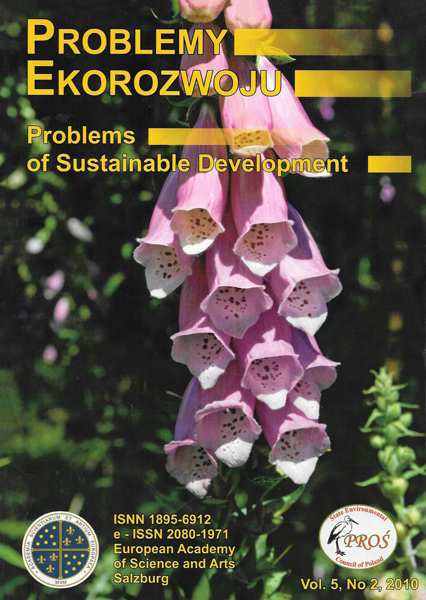Book Review: B. Latour, Polityka Natury, Wydawnictwo Krytyki Politycznej, Warszawa 2009
Article Sidebar
Issue Vol. 5 No. 2 (2010)
-
Is Development of Nowadays World Sustainable?
Lucjan Pawłowski9-12
-
Global Warming: The Origin and Nature of the Alleged Scientific Consensus
Richard S. Lindzen13-28
-
Triple Bottom Line Approach to Individual and Global Sustainability
G. Venkatesh29-37
-
Socio-Economic Aspects of Sustainable Development on Global and Local Level
Arkadiusz Tuziak39-49
-
Methodology and Key Issues of ISSP Environment Research Project from Sustainable Development Perspective
Paweł Rydzewski51-60
-
The Ecology of Silence as an Element of Systemic Sozology Which Enriches the Conception of the Sustainable Development
Wiesław Sztumski61-68
-
Philosophy of Sustainable Development – Preliminaries
Leszek Gawor69-76
-
Environmental Competitiveness of Regions – Attempt of Conceptualization
Armand Kasztelan77-86
-
Ecological Education for Sustainable Development – Theory and Practise
Agnieszka Hłobił87-94
-
Needs and Conditions of Education for Sustainable Development in Poland
Małgorzata Grodzińska-Jurczak, Ewa Gajuś-Lankamer, Anna Wójcik, Agata Pietrzyk95-106
-
Polish Society Facing Idea and Principles of Sustainable Development
Artur Bołtromiuk107-116
-
Contemporary Conditions of Socio-economic Development (Synthetics Approach)
Barbara Piontek117-124
-
Recycling of Construction Waste in Terms of Sustainable Building
Janusz Adamczyk, Robert Dylewski125-131
-
Information, Vatican: Current Crisis Calls for World Financial Reorganisation
Vatican Information Service133-134
-
Book Review: B. Latour, Polityka Natury, Wydawnictwo Krytyki Politycznej, Warszawa 2009
Zdzisława Piątek135-139
-
Book Review: W. Bojarski, Gospodarka i Państwo dla Społeczeństwa, Warszawa 2009
Lesław Michnowski140-148
-
Letter to the Editorial Office: Can Gene-centred View Demote Man?
Zdzisława Piątek149-154
-
Letter to the Editorial Office: Eco-efficiency for Sustainability: the Challenge Investigated at the 3rd Eco-Efficiency Conference, 9-11 June 2010
Gjalt Huppes, Masanobu Ishikawa155-156
-
Letter to the Editorial Office: A Revolution of the Middle… and the Pursuit of Happiness: Information About the Book
John Ikerd156-157
-
Letter to the Editorial Board: Sustainable Development Viewed Through Student Fieldwork, Focusing on Environmental and Socio-economic Issues: A Case Study from Scotland
Kevin R. Butt, Joanna Kostecka157-159
-
Communiques on Activities of the State Environmental Council of Poland
Tomasz Winnicki163-172
Archives
-
Vol. 7 No. 2
2012-07-02 14
-
Vol. 7 No. 1
2012-01-02 12
-
Vol. 6 No. 2
2011-07-01 19
-
Vol. 6 No. 1
2011-01-03 18
-
Vol. 5 No. 2
2010-07-01 21
-
Vol. 5 No. 1
2010-01-04 16
-
Vol. 4 No. 2
2009-07-01 19
-
Vol. 4 No. 1
2009-01-05 22
-
Vol. 3 No. 2
2008-07-01 19
-
Vol. 3 No. 1
2008-01-02 12
Main Article Content
Authors
Abstract
The main idea of Latour’s innovative idea, presented in the form of political ecology, is that he introduces established natures in place of the natural needs and interests of the non-human living beings who are part of the collective. It states that the members of the collective do not have ready-made essences and unchanging needs, but needs negotiated by the lower house of the collective. The author of this idea, however, forgets that only people can be meaningfully said, bringing them closer to the truth, that they do not have a ready-made nature or strictly biologically defined needs, and therefore they can be established through negotiations in the broadly understood upbringing processes. So it’s reasonable to say that negotiations can persuade people to become vegetarians, but to say that lions, tigers, and sharks can also be included in vegetarianism negotiations is absurd. To some extent, the nature of living beings can now be changed thanks to genetic engineering, but it is difficult to call genetic engineering techniques “negotiations”. It is only about humans that it can be reasonably said that they create as unfinished beings own nature (second nature) by participating in the world of culture. But also this specific feature of the human species is biologically determined.
Keywords:
Article Details
Abstract views: 81
License

This work is licensed under a Creative Commons Attribution-ShareAlike 4.0 International License.


